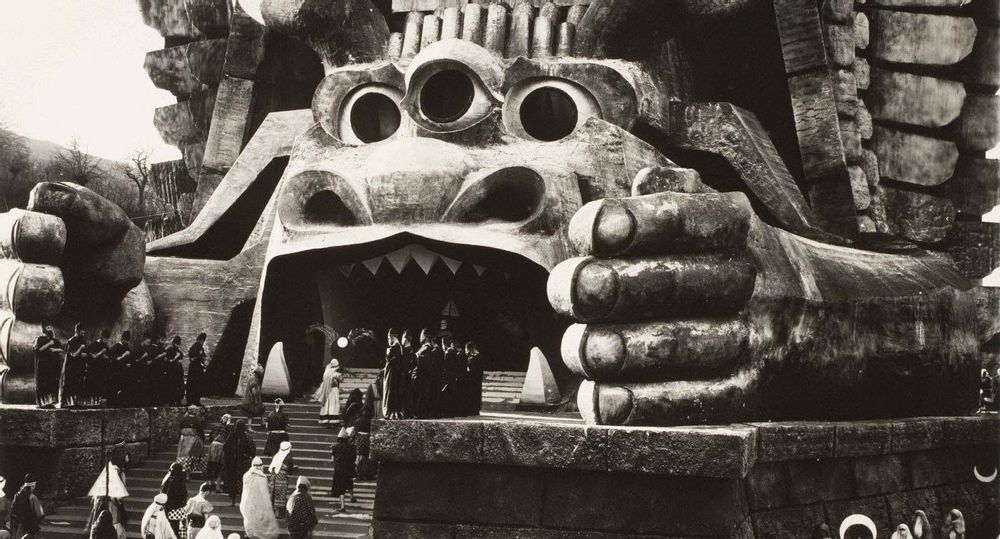
Cabiria is a 1914 Italian epic film directed by Giovanne Pastrone. It is set in Ancient Rome during the Punic Wars of the third century B.C.
At the beginning of the movie Cabiria is the 8-year-old daughter of Batto, a wealthy Italian patrician with an estate in Sicily. An eruption of Mt. Etna destroys Batto's mansion, and Cabiria is thought to have been killed in the fires. However, Cabiria is not dead; her nurse Croessa joined the other servants in looting their master's estate, and Croessa took Cabiria with her.
Unfortunately for Croessa and Cabiria they are soon captured by Phoenician pirates and sold into slavery in Carthage. Carthaginians are in the habit of sacrificing young children to the god Moloch, and little Cabiria is picked to be one of a hundred kids to be thrown into the fire. Croessa makes her way to Fulvius Axilla, a Roman businessman in Carthage who is actually a spy. Fulvius, and his hulking, enormously strong black slave Maciste (who would later go on to star in his own incredibly long-running film series, though only after turning white) arrive Just in Time to save Cabiria from being sacrificed. Eventually little Cabiria is hidden with Sophonisba, a Carthaginian princess promised in marriage to the Numidian king Massinissa.
And there are even more characters than that.
Cabiria originally ran a whopping 200 minutes. It survives today in cuts running anywhere from 126 minutes to 190 minutes in a 2006 restoration. It was not the first feature film, as several films in the 60-90 minute range had already been produced, but it was unprecedented in its length and scope, with enormous sets and the proverbial cast of thousands. It made an obvious impact on D. W. Griffith, who took a lot of inspiration from Cabiria when filming the "Fall of Babylon" portion of his 1916 epic Intolerance.
Tropes:
- Arranged Marriage: Sophonisba is promised in marriage to Massimissa, but it's a love match. When Massimissa is overthrown by Syphax, she's married to him in a wedding she is much, much less enthusiastic about.
- Blackface: Used for all of the actors playing Africans, including Bartolomeo Pagano as Maciste.
- Breaking the Fourth Wall: When Bodastoret the innkeeper is introduced, he looks straight at the camera and gestures as if inviting the viewer to stay at his inn.
- Breakout Character: Maciste the slave. Actor Bartolomeo Pagano played him in over two dozen more films after Cabiria and the character has been featured in dozens of other Italian films over the decades.
- Catapult Nightmare: They date back to 1914! Sophonisba has one about being eaten alive by Moloch, and Cabiria being Carthage's doom. After waking up from her Catapult Nightmare she agrees to hand Cabiria over to the priests of Moloch for sacrifice.
- Driven to Suicide: Sophonisba is finally reunited with Massimissa, the latter having fought for the Romans and toppled Syphax, but when the Roman consul arrives he demands Sophonisba as a prize of war. So Massimissa has Maciste smuggle her some poison, and she kills herself, but not before freeing Cabiria and reuniting her with Fulvius.
- Epic Movie: The first.
- Eye Scream: When Maciste subdues Karthalo who tried to rape Cabiria he grabs his eyes, and he could have actually gouge out his eyes.
- Historical Domain Character: Hannibal is shown crossing the Alps to assault Rome, Archimedes assembles his death ray to set Roman ships on fire (one of the big setpieces of the movie), and Roman general Scipio attacks Carthage.
- Hollywood Darkness: That basement that Fulvius and Maciste are trapped in is strangely well lit.
- Human Sacrifice: Holy crap. Chucking little kids into the fire for Moloch is pretty hard-core.
- The Lancer: Maciste is pretty badass, scaring the crap out of all of Fulvius's enemies, often bailing his master out of jams, one time literally pulling the bars of a prison cell apart.
- Living MacGuffin: The movie is called Cabiria but Cabiria does absolutely nothing over the movie, except occasionally cower in fear, and constantly need rescuing.
- Made a Slave: Croessa and Cabiria are sold into slavery. Cabiria is briefly liberated but eventually becomes the long-term slave of Sophonisba. Croessa is executed for helping Cabiria escape the priests of Moloch.
- Never Found the Body: Batto is way premature in assuming his daughter to be dead.
- Soft Water: That's one heck of a high cliff that Fulvius dives off of when escaping the Carthaginians.
- Solar-Powered Magnifying Glass: Archimedes is shown experimenting with his death ray, which is then used with devastating effect on the Roman fleet.
- A Taste of the Lash: Croessa is whipped for trying to prevent the priests of Moloch from taking Cabiria away for sacrifice. Later Maciste is whipped for the same offense.
- Would Hurt a Child: Sacrificing eight-year-olds to Moloch certainly qualifies.
